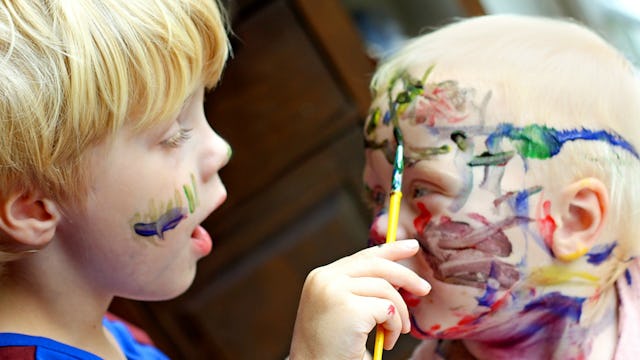I Don't Know If I Will Make It Through The Threenage Years

“This is the best age,” said an elderly woman at the park, smiling at my 3-year-old son. I exchanged a polite smile. But what I really wanted to say is “Are you kidding me? This creature is a monster.”
When my son turned 3, he became impossible and his bad behavior escalated to a miserable level. I was caught off guard because I bought into the myth of the terrible twos and thought I was doing well enduring toddlerhood until — bam! — my son turned 3 and things got real. I found myself missing my tantrum-throwing 2-year-old who was mostly cute and a source of laughter. I was stuck with a threenager (now I fully understand why this term is used) and I wished to thump on the forehead those who claimed 2 was the the worst age. They were full of it.
If you are like me, you will need help surviving this trying age. So I’ve collected frequently asked questions and done my best to answer them as truthfully as possible. I hope they prove helpful.
Why are 3-year-olds so awful?
Why is the grass green? The sky blue? I don’t know. I’m sure a child psychologist could offer an answer to why Mother Nature requires this developmental stage, but all I can do is open your eyes to the fresh hell you are entering. Prepare yourself for chaos.
A few weeks ago, I sat on my comfy couch reading the New York Times, sipping fresh coffee, engrossed in a story. In the middle of the article, a 35-pound force busted through the paper like a high school football player running through a banner. I jumped out of my skin. Coffee spilled on my lap. I uttered an unmentionable word. And you know what the lil’ jerk did? Laughed. He laughed at my scalded crotch. Despite my best efforts to deter this behavior, the kid does it to me every Sunday morning and laughs in my face. I don’t drink coffee while reading the newspaper anymore.
What motivates the 3-year-old?
A 3-year-old has one goal: the decimation of your psychological well-being. They are experts at pushing your limits until your mental health dangles by a thread and then, sensing weakness, press harder. In their gleeful eyes, you can see their calculations to undo you.
I typed on my laptop at the kitchen table. My son leaned against my shoulder trying different tactics to divert my attention — banging on keyboard, yelling, sticking fingers in my mouth. When his efforts failed, he dug into his nose and wiped the largest booger/snot-rocket combo to come out of a little person’s nose across my computer screen. I looked at him startled. “How about that?” he said, giggling, proud of his handiwork. The snot ran down the screen and forced me to stop and clean it. Did he get my attention? Yes, he did.
How bad can it get?
The month my son turned 3, his ability to listen shut off and his goal to undermine my sanity rose to the top of his toddler bucket list, right above visiting Legoland. Damn kid doesn’t hear a word coming out of my mouth unless it involves gummy worms, monster trucks, or watching Paw Patrol. Typical toddler behaviors like screaming, kicking, and throwing escalate, but I believe the psychological warfare waged by 3-year-olds is an act of evil.
The most effective tactic of the 3-year-old is taking a simple activity or interaction and making it as difficult as possible. For instance, exiting the car so we don’t miss our doctor’s appointment turns into a 10-minute negotiation/wrestling match. Here is my son’s latest trick: He will beg for forever to do something like go outside or to the playground, and as soon as I give in and fully prepare us for agreed upon activity, he will reverse his decision, refusing to participate. It sounds benign, but when a child does it 300 hundred times a day it qualifies as torture.
What to do if you snap?
Apologize. Hug them. Bribe them. Move on.
Is it possible to survive them?
Yes. It is possible, but you will need to learn coping skills. Here are a few of mine: King-sized KitKats, Cokes, cajun filet chicken biscuits, and potato wedges from the grocery deli.
This age kind of sucks. But I’m trying to keep in mind it is a phase like all other phases of a child’s development. It shall pass. Maybe not as soon as I would like, but it will pass. It always does. A veteran parent once told me, “If he is still acting like this when he is 16, let me know and we’ll take him to a psychologist. Otherwise, just let it be.”
So my only advice is to laugh when you get the chance. Take breaks. Laugh at the absurdity of it all. Take more breaks. Eat KitKats. Laugh some more, so you don’t totally lose your shit all the time.
This article was originally published on